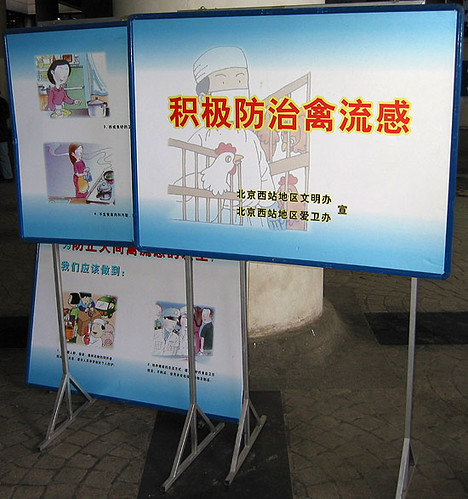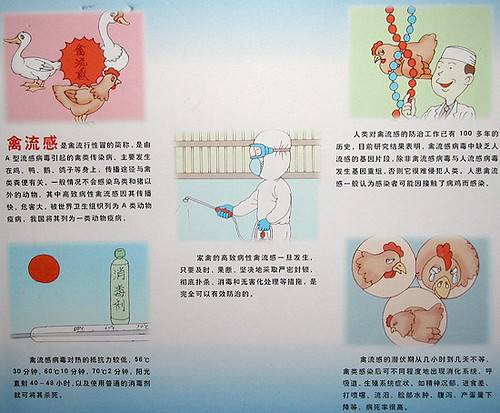Avian flu continues to spread from its home in the chicken shacks of Guangdong province across the globe, almost as if it were some sort of highly infectious disease or something. Luckily, the Chinese Communist Party has been on the case for over a year and a half now. These are two photographs I took on March 4, 2004 of signs posted in the Beijing train station explaining the dangers of bird flu, and how to prevent it from spreading. I’m especially touched by the little teardrop in the chicken’s eye.


On a related note, the Washington Post has the following headline on their front page as I write this: Bird Flu Drug Shipments Suspended in U.S. While the article (from the AP) itself has the more straightforward headline of Roche Suspends Tamiflu Shipments to U.S., it does contain the line “Tamiflu, the only drug shown to be effective in treating bird flu.” Funny they should say that, since the reports I’ve been reading seem to indicate that Tamiflu isn’t actually much help.
According to The Times (the British one)
The Government’s strategy of stockpiling antiviral drugs was dealt a blow yesterday, however, when a study revealed that Tamiflu, the drug they were stocking, could be ineffective.
There was panic-buying of antiviral drugs on the internet, but the Department of Health said yesterday that many of them could be dangerous fakes.
According to the Harvard Vanguard Medical Association:
Should I stock up on antiviral medications, flu drugs, like Tamiflu?
No. There are a few reasons why having Tamiflu available in your home is not a good idea.* It’s not clear whether Tamiflu is effective against the current strain of the avian flu. In addition, flu viruses are constantly changing so that if there is ever an outbreak of bird flu in the US, Tamiflu may not be effective against that strain.
* Taking an antiviral medication such as Tamiflu if not necessary may cause the virus to develop resistance to the medication. In that case, Tamiflu may become ineffective against bird flu and against the ordinary flu when needed most, during an outbreak.
* Stocking up on Tamiflu ‘just in case’ may create a situation where those who truly need it may not be able to get it.
* If you store Tamiflu at home for an extended period, it may expire before you use it.
* You won’t know when you need Tamiflu. Many different viruses cause flu-like illnesses, and without testing no one can know if an illness is flu, or whether it’s bird flu or regular flu. Tamiflu should only be taken if a physician has diagnosed your illness.
* Taking unnecessary medications increases your risk of possible side effects and allergic reactions.
* Tamiflu is not a vaccine; it can’t protect you against flu in the future if you take it now. It is only effective while you are taking it.
* Most importantly, we don’t know if there will ever be an outbreak of avian flu in the U.S.
And according to this article on the website Recombinomics dating all the way back to February, there was never any real evidence that Tamiflu was effective against the disease.
Although Tamiflu has been used to treat H5N1 patients, the number treated has been low, and many were treated after the recommended time period, which is within 48 hours of symptoms. For the latest H5N1 patients in southern Vietnam, there were no reported discharges, so all died regardless of when they started taking Tamiflu.
[…]
Tamiflu was used in vivo in an effort to save tigers at a Thailand zoo. The zoo housed 441 tigers and some were fed H5N1 infected chickens. Initially only 3 or 4 tigers showed symptoms, but the number increased each day. Those that had not been fed chickens were segregated away from those fed infected chickens. Several days after the initial deaths more tigers became ill. The tigers were treated with Tamiflu, but eventually 45 tigers died and 102 were euthanized for humanitarian reasons. Thus, in spite of Tamiflu treatment, 33% of the entire population died, but this could have been close to 100% of the infected population.
I’m not really qualified to judge the content of an unknown site about infectious disease, but it does seem to match with what I’ve been reading in general newspapers.
Isn’t it dangerously irresponsible to write a newspaper article fearmongering about a drug shortage without even mentioning the very real possibility that the drug in question may be ineffective? But hey, Roche’s stock is at an all time high of $174.16, up 40 from the beginning of the summer. Better keep fueling that fire.

